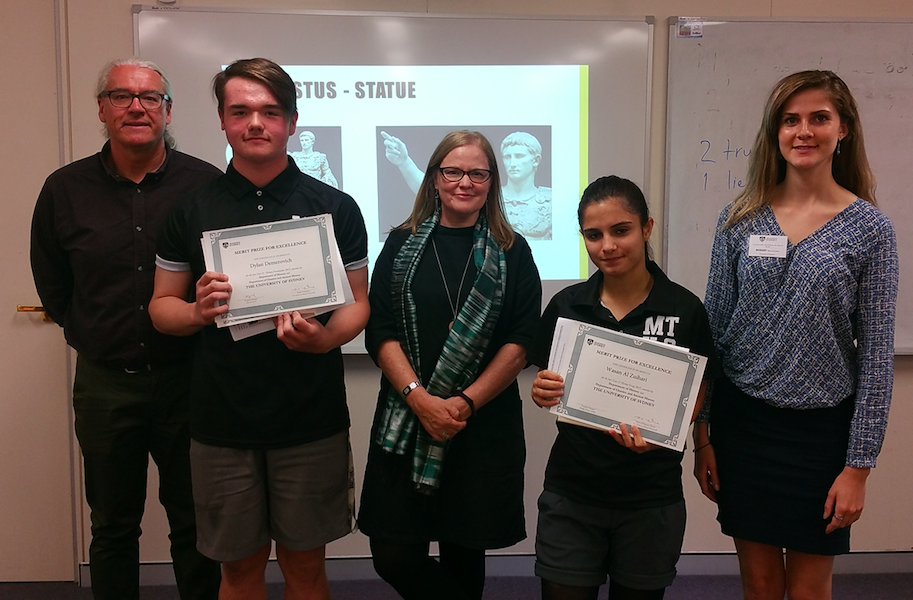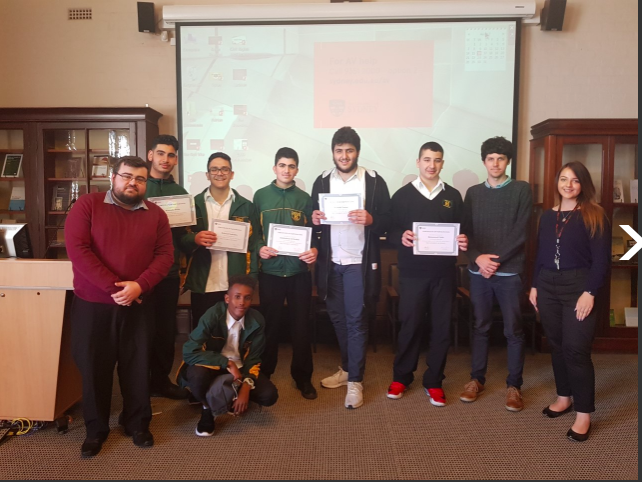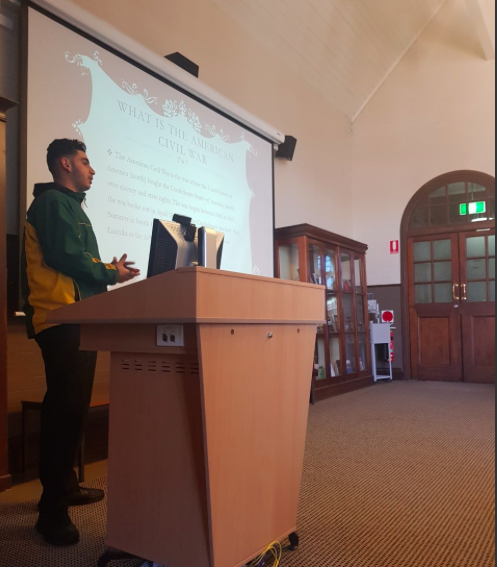On the 6th of December Frances Clarke, Michael McDonnell and Bridget Neave visited Miller Technology High School on behalf of the University’s Social Inclusion in Humanities Program. Miller Technology is a unique school as 40% of its students are refugees.
The attendees partook in the Stage 6 humanities awards afternoon. The essay winners of the year 11 mentoring program were Wasan Al Zuihari for first prize and Dylan Demerovich for second prize. They had investigated gender roles in Spartan society and Julius Ceaser, respectively. The winners were recognised by the department representatives, their teachers and peers. They were congratulated by Mike and Frances and awarded with bookstore vouchers. The winner for best presentation, Dylan Demerovich, gave his presentation on the life of Julius Caesar to the gathering.
Mike and Bridget followed with short presentations on the value of tertiary education, the challenges that face first in family/low ses students, and how students can find support and opportunities.
The day ended with afternoon tea and the opportunity for the visitors to talk with the students. It was enriching and challenging to learn about the life experiences and future plans of the diverse group of students. Mike, Frances and Bridget all reflected on the infectious enthusiasm and ability displayed by the students in their studies and towards tertiary education.
Unfortunately, Miller Technology has a very low rate of sending students to the University of Sydney. Tony Podolsak, headteacher of history, spoke anecdotally of students giving up places at USYD due to not knowing anyone who had gone there and a perceived lack of support they would have. Barriers like this are what the Social Inclusion unit seek to challenge with the Year 11 Mentoring Program.
A big thanks to our partners at Miller Tech, especially Tony Podolsak, who make the Social Inclusion visits so meaningful to both the students and staff involved.
For anyone interested in being more involved with social inclusion in history and becoming part of the committee for 2018, don’t hesitate to email the project manager Bridget Neave at [email protected].

By Bridget Neave
Author: bnea3448
Year 11 Mentoring Program Presentation Day (August)
To celebrate the culmination of the 2017 Year 11 mentoring program, approximately 40 students and teachers from Granville Boys and Miller Tech joined with History department staff and students at the University. The students gave presentations on the interest-based projects they had been working on with their mentors throughout the year. Students, teachers and mentors alike were impressed by the breadth of projects – from Australian Republican debates to Spartan social class distinctions.
The presentations marked the end of the social inclusion program for 2017 which has been in operation since May. The purpose of this program is to pair high school students with university mentors to assist with their independent project for Year 11 history. The process starts with picking a topic and framing a question, moves into gathering sources and conducting research, then to structuring the essay. Finally, the writing the essay occurs as well as the transformation of the essay into a final presentation.
The program also provides the chance for the Year 11 students to become more familiar with the University of Sydney and creates a space where the students can ask mentors questions about their university experiences. Unofficial connections between the university, and students from a diversity of backgrounds and areas, is what the social inclusion program seeks to create and enhance. Mentors of the program report coming away from the presentations uplifted, and with a sense that they are helping to steer Sydney University’s educational outcomes in a meaningful direction. The connections between the student, the mentor, and a love of history were described as beneficial for all involved.
Frances Clarke, Social Inclusion coordinator, commented on the project:
“Listening to the history presentations is fun as well as enlightening. It actually feels a bit festive. The students seem excited to be here, telling us about the projects that they’ve been working on for so long. The Usyd student mentors are in the audience to see the culmination of all their mentoring work. And the teachers look proud to see their students at a podium, giving a mini lecture in front of an audience of strangers (something that I couldn’t have imagined doing in high school). I always learn something from the students’ papers but, more than that, I find their courage inspiring. It’s a reminder that history can be empowering in more ways than one—not just through uncovering unique pasts or contextualizing the present, but also simply through the act of sharing compelling material. The first time that I attended a presentation day, I decided it was one of the best things I’d ever been to on campus, and this year’s presentations only confirmed that conclusion.”


Social Inclusion in History looks forward to continuing and building on work like this, in the 2018 Program!
By Bridget Neave & Emma Kluge from the Social Inclusion Unit
